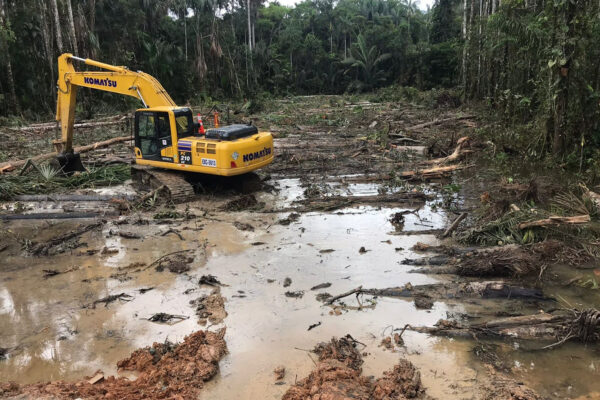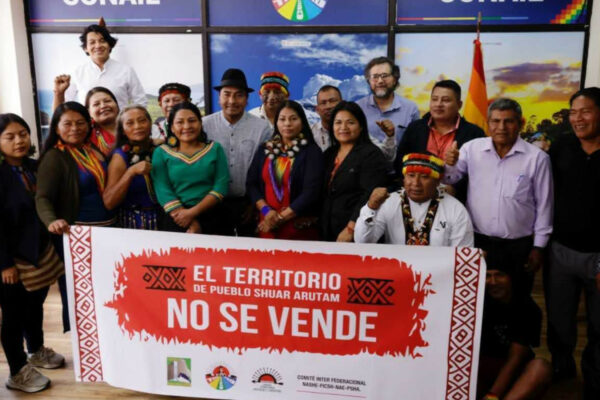Some years ago, the Council on Ethics within Norway’s Government Pension Fund Global (GPFG) began investigating oil and gas company Repsol. The council’s stated aim is to evaluate “whether or not investment in specified companies is inconsistent with the [Fund´s] established ethical guidelines” before making recommendations to the Ministry of Finance, and the reason it was interested in Repsol was because of its operations in a remote part of Peru’s Amazon inhabited by indigenous people living in “voluntary isolation” who have no regular contact with anyone else.
What, if anything, did the Council conclude? According to Anders Krogh, from the NGO Rainforest Foundation Norway (RFN), the Council presented a report to the Ministry in 2011 recommending that Norway disinvests from Repsol.
Krogh, relying on several anonymous sources, tells me:
We have now got it 100% confirmed that the Council on Ethics of the Norwegian Government Pension Fund Global, which sits within the Finance Ministry, has sent a recommendation to the Finance Minister and the Norwegian Central Bank to withdraw all investments from the company because it threatens isolated indigenous peoples living between the Napo and Tigre rivers in Peru.
If this is true, it’s a Big Deal and should set an important precedent – for capitalism and human rights in general, and for the GPFG, which handles over US$700 billion and is reportedly considered by some to be the largest sovereign wealth fund in the world, in particular. But what does it matter if the Ministry ignores its own advice? Says Krogh:
Norway’s government boasts that its Pension Fund has the highest standards of ethical investments in the world, and, in addition, Norway is a high profile country on rainforest protection and human rights. Why then does it continue to support these severe encroachments on indigenous peoples and rainforest in the Napo-Tigre region? It is double standards. The Council made its recommendation to withdraw from Repsol two years ago, but nothing has happened.
In addition to the financial ramifications, any such recommendation would also be a Big Deal for Repsol as well as another company operating in the Napo-Tigre region, Perenco, because both defend opposition to their operations from indigenous organizations and NGOs by claiming there is no evidence that the “isolated” people really exist. Indeed, Peru’s Ministry of Justice and Human Rights has claimed the same in correspondence with the Inter-American Commission on Human Rights following an appeal to the Commission by national indigenous organization AIDESEP.
According to the Council on Ethics’ website, “The Ministry [of Finance] makes the decision on exclusion of companies from the Government Pension Fund’s investment universe based on recommendations from the Council. [Our role is to] evaluate whether potential investments in financial instruments…are inconsistent with the Fund’s ethical guidelines.”
These guidelines include excluding companies that cause “severe environmental damage” and perpetrate “particularly serious violations of fundamental ethical norms.” The list of excluded companies currently stretches to 55 and includes Boeing Co, Barrick Gold Corp, Lockheed Martin Corp, Rio Tinto Plc, Samling Global Ltd, Vedanta Resources Plc and Wal-Mart Stores Inc.
Krogh doesn’t say the reason the Council has given for its possible Repsol recommendation, but the people living in “voluntary isolation” – as Peruvian law calls them – lack immunological defences and therefore could easily be decimated by disease if any contact is made between them and the company’s workers.
According to Peru’s Ministry of Energy and Mines (MEM), Repsol’s concession in the Napo-Tigre region, called “Lot 39”, has “probable” oil reserves larger than any other concession in the country.
In June MEM gave Repsol the green light for exploration requiring 1,300 workers and involving drilling 21 wells, conducting seismic tests, and cutting 3,770 kms of 1.5 metre-wide paths through the forest. All the tests and 20 of the wells are scheduled to be inside a proposed reserve for the “isolated” people.
So is it true that the Council has recommended that the Ministry disinvests? “We cannot comment on this,” a member of the Council’s secretariat tells me.
But is the Council aware that Repsol has recently been given permission to explore? “Yes, we are.”
And is the Ministry required to respond to the Council’s recommendations within a specified time-frame? “No, it is not.”
RFN’s Krogh calls this a “massive loophole in the regulations”:
There’s no limit on the time the Ministry can use to review a recommendation from the Council. In principle, the Ministry can sit on a recommendation indefinitely, and we suspect that this is a deliberate tactic to avoid negative reactions to disinvestment from the home countries of the excluded companies.
The Ministry itself declined to say whether it has received a recommendation to disinvest. It says in an email:
The Ministry does not comment on individual companies or whether or not we have received a recommendation until we have reached a conclusion in a given case. The Ministry discloses the Council on Ethics’ recommendations when the relevant securities are sold, or when the Ministry has made a final decision not to follow the Council’s recommendation.
Asked if it is aware of Repsol’s exploration plans, the Ministry says it “does not itself monitor the actions of the approximately 7,000 companies in the Fund. Any information about a company in the Fund’s portfolio should be directed as appropriate to the Council on Ethics.”
In June, in an interview with the Norwegian Broadcasting Corporation, former Council head Gro Nystuen criticized the Ministry’s slowness to make decisions and lack of transparency, saying that all of the Council’s recommendations, whether heeded or not, should be made public.
Repsol has held the license for “Lot 39” since 1999 and has already made several heavy crude oil discoveries. As of 31 December 2012, the GPFG’s holdings in the company stood at 1.7 billion Norwegian kroner – approximately US$300 million at current exchange rates.













